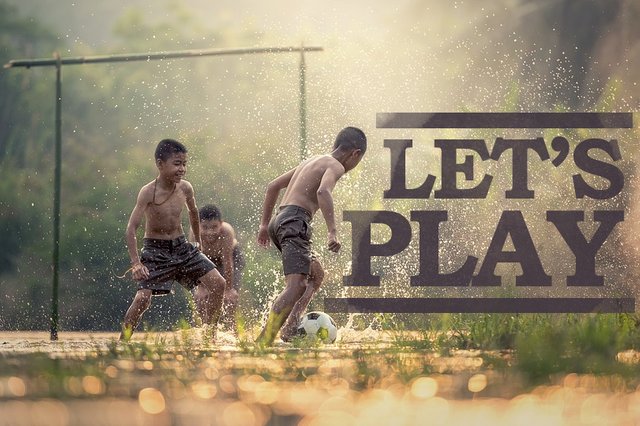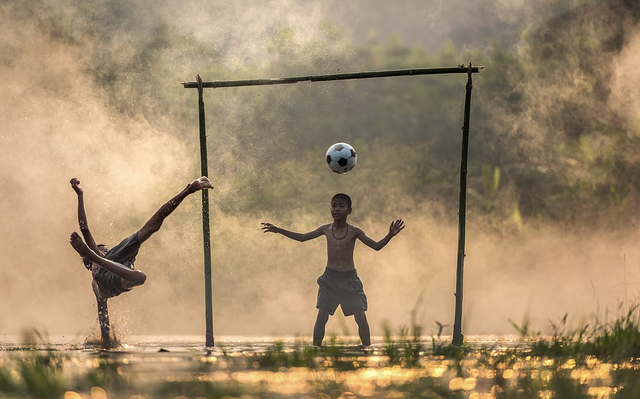My Favorite Way to Encourage Children to Participate in Sports
Regular physical activity and exercise are of paramount importance for the proper development of every child, but getting enough exercise has been a problem for the youth for a long time now. And it's a problem that's only getting worse. As smartphones, tablets, computers, TVs and toys are getting more and more interesting and sophisticated, getting some children to be interested in any kind of sport is becoming all that more difficult. Finding ways to encourage kids to participate in sports is increasingly important for teachers, parents and educators and I guess that's why it is this week's homework assignment proposed by @steemiteducation.

My Proposed Solution
No matter what you want to encourage in children, my favorite method is always going to be a variation on the same thing - get them to think about the topic in new ways. This usually includes getting them intellectually involved and invested which helps keeping them engaged and interested.
So what's my favorite way to get children to think about sports in a new way, so they would become more interested?
Get Them to Invent Their Own Sport
At first, this might sound difficult or as something that might easily go astray, but I assure you that with the proper guidance, it can actually be a whole lot of fun. It's something that can be done with children and adolescents from all ages and with groups of all sizes (including one). The biggest benefit of taking this approach is the psychological effects of creating something of your own - emotional investment. This means that the mere act of participating in the process of developing a brand new sport, inevitably makes you more likely to participate in it when given the chance as it's something you feel is your own.
The Process of Guiding a Group of Children in Creating a New Sport
1. Goals
The first thing that you need to keep in mind when you approach this task is realizing that the resulting sport doesn't really need to be something absolutely unique or unheard of. What you want to achieve is something that feels new to the participants and you want them to feel ownership of the resulting game. It can be a simple variation on a sport that already exists or something very similar to an existing sport the group is not too familiar with.
Additionally, it's quite important to make sure that you already have the required equipment and location to practice the newly invented sport. But first and foremost you need to make sure that the sport is going to be safe to practice for the particular type of children you are responsible for.
2. Posing the Question

The first thing to do when approaching the subject might be to ask the children about their favorite sports. How they are played, why are they interesting to watch, why are they fun to play and so on. You can also ask them about their least favorite sports and what they don't enjoy about them.
Then you can assign the mission of creating a brand new sport. Depending on the group and the circumstances you might want to guide and limit the process in different ways to make sure you get to a satisfying and safe outcome.
One thing to keep in mind is that if you just throw the question at a group of people regardless of their ages, you are most likely to get mainly blank stares as nobody is really used to inventing new games. So in order for you to get their creative juices flowing, you have to break down the question into different categories and aspects. Providing some structure would allow for the participants to start expressing their creativity.
Suggested aspects of the sport to talk about:
- Scoring
- Field of play
- Accessories (balls, sticks, racquet's, gloves etc.)
- Teams
- Roles within a team
- Engagement between opposing teams and players
- Special rules
- Forbidden actions and penalties
- Game duration, segments and breaks
- Fairness
- Safety
Obviously, you can think of your own versions of this and you can also fix some of those in advance so they don't have to invent everything. For instance you can ask the group of children to invent a sport that is played with a basketball on a baseball field that also involves ropes, lasts for two periods of 45 minutes and involves 4 teams. Some of the limits might be dictated by what is available to you and others might be just random. Some constrains and structure will usually bolster the group's creativity as this will give them fewer things to think about all at once.
Another preliminary activity to do to open their minds up to the question might be to ask them to fill out the aspects mentioned above for some existing sports and to tell the about less common sports like capture the flag, curling or 3-sided soccer.
3. Guiding the Discussion

It's usually important to remain a moderator of the discussion. You have to make sure that everybody is involved and that everybody's contributing. If just one or two people take charge of the invention while the others are sitting idly by, this is what you'll get when you try to play the game afterwards too. The children are going to be interested to play a game that they feel is their own, not a game that was invented by somebody else while they were bored.
There are a few different ways to keep people involved. Everybody might brainstorm together while you keep notes or you could split the group into different subgroups to create different ideas or to develop separate aspects of the game. Whatever approach you choose, make sure that everybody understands that first you need to generate enough ideas and that incompatible visions are still OK at this stage. No need to rule out any ideas just yet, you can even have fun with some comically unsafe ones.
After the ideas have been generated, step back and discuss them together. Try to evaluate them on the basis of fun and safety and look for ways to incorporate different ideas together.
4. Taking a Decision
Finalizing the rules of the new sport should be a clear event and should be done democratically. The best way might be to compile the viable suggestions for each aspect of the game and putting them to a vote. Unsafe suggestions should obviously have be eliminated before the vote and you can clearly veto anything that might be dangerous or stupid.

Playing the Newly Invented Sport
After all of the mental exertion to create a brand new game, the children should be pumped up about putting the game to practice. It's very important to stage this as a trial and a test of the rules of the game, not a competition right away. There will probably be things that don't work as expected, there might be situations that you simply didn't imagine and don't have rules for and so on and so on. Everybody should understand that the game is a work in progress and should still feel ownership of it. If you deem it needed, stop the game, allow the children to suggest quick changes and fixes or suggest them yourself, and put new ideas to a quick vote if appropriate.
After playing the first game, creating your new sport is not over. Don't forget to hold a feedback session where people can say what they enjoyed about their invention, what worked, what didn't work and what changes need to be made so the game becomes even more fun. This will allow the group to continue to have ownership of the sport, to continue to have fun with it and to stay motivated to actually go out and play it over and over again.
Making this a long-term project is something that might allow long-term engagement with physical activity and the intellectual aspects of creating it can allow a wider variety of people to stay engaged with it. After all, we want to encourage the children to do physical exercise in a fun way with long-lasting effects. This might be an unconventional way to do it that requires some effort, preparation and consistency, but it's something that could lead to really interesting results.
Additionally, a project like this can be used to examine the rules of existing sports in a new light and children who have the experience of trying to create a sport of their own could be more likely to appreciate existing sports in new ways because of it.
Possible Variations
Inventing a new sport as an activity of its own can have countless variations and can be implemented in all kinds of contexts. While I think one of the best implementations is as a long-term project for a group of children, it can also be used by a single parent with a single child to fill a 15-minute window with physical activity.
What's important is to use the child or children's creativity and curiosity to encourage them to participate and be interested in sports.



I really like this approach and think I will try something along these lines with my children when they are older. (Twins, only 8 months now) I don't want to stifle creativity, but I also want them to be active.
Out of curiosity are you an educator of some kind?
I'm glad to hear that!
I started in education as an informal educator in a youth movement as a teenager and I was a high school teacher for a few years in my mid-twenties (I taught English and Physics).
Congratulations! This post has been upvoted from the communal account, @minnowsupport, by rocking-dave from the Minnow Support Project. It's a witness project run by aggroed, ausbitbank, teamsteem, theprophet0, someguy123, neoxian, followbtcnews, and netuoso. The goal is to help Steemit grow by supporting Minnows. Please find us at the Peace, Abundance, and Liberty Network (PALnet) Discord Channel. It's a completely public and open space to all members of the Steemit community who voluntarily choose to be there.
If you would like to delegate to the Minnow Support Project you can do so by clicking on the following links: 50SP, 100SP, 250SP, 500SP, 1000SP, 5000SP.
Be sure to leave at least 50SP undelegated on your account.
Congratulations @rocking-dave! You have completed some achievement on Steemit and have been rewarded with new badge(s) :
Click on any badge to view your own Board of Honor on SteemitBoard.
For more information about SteemitBoard, click here
If you no longer want to receive notifications, reply to this comment with the word
STOP